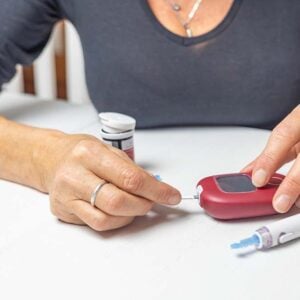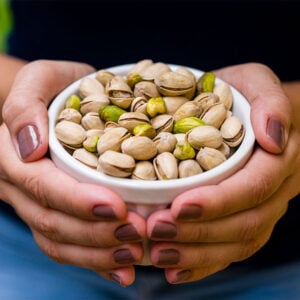
Top 5 Must-Have Nutrients for Your Eyes
When your vision takes a nosedive, so does your quality of life.
The bad news is that the older you get, the higher your chances are of developing a serious eye problem (like cataracts or age-related macular degeneration).
In fact, the leading cause of blindness—age-related macular degeneration—is expected to triple over the next 30 years.
That’s a BIG problem since vision problems can increase your risk of dying.
The good news is that there are steps you can take to reduce your risk of eye problems AND the deadly risks associated with them.
And it starts with these five nutrients…
A recent meta-analysis that looked at data on 48,000 people found that people with mild vision impairment had a 29 percent higher risk of mortality.
And those with serious vision impairment had an 89 percent increased risk of mortality.
That’s because vision impairment increases the risk of serious problems like falls, cognitive impairment, and even dementia.
Fortunately, maintaining your eyesight as you get older isn’t the luck of the draw. Studies indicate that four out of five cases of vision impairment can be prevented—or even corrected.
This is in part by wearing the proper glasses, and in part by having cataracts removed.
In addition, there are steps you can take to maintain your vision no matter how old you are. You can start by adding these 4 key foods into your diet.
Oranges
Oranges contain plant pigments called carotenoids that give them their orange color. These compounds can inhibit inflammation in your cells, a key underlying cause of eye problems.
Studies have shown that increasing your intake of carotenoids reduces your risk of age-related macular degeneration.
I prefer to eat oranges as opposed to drinking orange juice because the fiber slows the absorption of sugar into your bloodstream.
Red Bell Peppers
Like oranges, bell peppers are a good source of carotenoids. They also have high levels of vitamin C, with just one pepper containing 233 percent of the RDA of vitamin C!
That’s great when it comes to your eyesight, since studies have shown that high intake of vitamin C is associated with a reduced risk of cataracts.
Sweet Potatoes
Do you see a pattern here? Another food in the orange/red family are sweet potatoes. They’re a great source of beta-carotene, which your body then coverts to vitamin A.
Your body needs vitamin A to produce enough moisture and pigments for your retina to function properly. This is key for preventing dry eyes and night blindness.
Just one sweet potato will give you 100 percent of your daily requirement for vitamin A.
Salmon
Yes, another orange food has made the list. Salmon and other fatty fish are high in omega-3 fatty acids, which are key for the health of your retina.
Studies have found that omega-3s can help decrease the risk of macular degeneration, dry eyes, and glaucoma.
In fact, one study showed that people who ate oily fish like salmon just once a week had their risk of developing “wet” macular degeneration in HALF.
And while we’re talking about colors, the one color you should be avoiding is BLUE, especially at night.
The blue light that emits from devices like your TV and smart phone has been connected to an increased risk for eye strain, macular degeneration, and can cause retinal damage.
P.S. Click here and read about the five “grandmother cures” that not only strengthen your vision… but they help boost your memory and MORE!
Written By Dr. Richard Gerhauser, M.D.
For years he’s been the trusted doctor for celebrities, world-class athletes, and countless seniors looking to reclaim their health.
And now…for the first time ever… he’s making his medical breakthroughs available to readers all across America.
Dr. Richard Gerhauser, M.D. is one of the most pioneering and innovative minds in medicine today – and he delivers cutting-edge cures each month through his Natural Health Response newsletter.
Natural Health Response readers get full access to Dr. Gerhauser’s protocols for chronic pain… heart disease… diabetes… Alzheimer’s… and even cancer. These are the very same treatments Dr. Gerhauser recommends to his own patients at his practice in Tucson, Arizona.
In addition to being a board-certified medical doctor, Dr. Gerhauser has earned two master’s degrees and has served as a clinical professor at the University of Arizona.
And as a physician at the world-famous Canyon Ranch, Dr. Gerhauser treated celebrities from around the world who paid dearly for the type of next-generation health information he provides Natural Health Response readers each month.
View More Free Articles
5 Ways to “Beat the Bloat” This Thanksgiving
As we prepare for Thanksgiving week, there’s a lot to look forward to and be thankful for. Family gatherings, football games, great food, and even better desserts top the list. Then there are all the leftovers. It’s not a holiday that’s known for moderation. But if you’re not careful, overdoing it on Thanksgiving could leave […]
Eat THIS to Reduce Your Risk of 14 Cancers
I’m a meat-and-potatoes guy. I’ll never turn down a big, juicy steak. But even more than that… I’m a fish guy. There’s not much I like more than a perfectly grilled salmon. I hope you do, too, because salmon contains two potent nutrients tied to a reduced risk of 14 types of cancer. Omega-3s are […]
The Bad Habit Robbing YEARS from Your Life
I often get eye-rolls when I stress just how essential lifestyle factors like light reducing pollution and grounding are good for health. But new research continually proves that I’ve been right all along. Today, a critical new study shows that something I’ve warned you about for YEARS is tied to a 34 percent increased risk […]
Reduce Colon Cancer Risk by 30%
More than 150,000 people are diagnosed with colorectal cancer yearly. Another 35,000 will get a liver cancer diagnosis. But if you have type 2 diabetes, your risk of developing one of these skyrockets—a 47 percent increased risk of colorectal cancer, and a two to three times higher risk of liver cancer. That’s why I’m excited […]
“Dinner Plate” Danger Raises Prostate Risk
Did you know that prostate cancer is FAR more prevalent in developed parts of the world than in less developed regions? Strange right? What is it about our modern, developed society that’s attacking our male population? There are MANY answers to this question. The primary one I will focus on today is a significant environmental […]
The 5-Minute Solution to Better Blood Pressure
Are you one of the millions who battle the so-called “silent killer” hypertension? And do you have five minutes to spare daily? If so, you could be well on your way to significantly healthier blood pressure. Sound too good to be true? A new study proves it. And the best part? It’s incredibly easy If […]
“Eye-Opening” Benefits of Pistachios
Imagine if there were a daily snack that could protect your vision. Well, a recent study brings good news for the 20 million U.S. adults already battling macular degeneration—the leading cause of vision loss for those over 60. Adding a handful of pistachios to your diet might help shield your eyesight. Let’s take a “look.” […]
Get Better Blood Sugar This Holiday Season
Let’s face it. The holidays are NOT good for your waistline… or your blood sugar levels. Potlucks, family dinners, cookie exchanges, Christmas parties… you know the drill. So, if you’re one of the 98 million people on the brink of type 2 diabetes, it’s VITAL to take steps to manage your blood sugar levels as […]
Common Vitamin Is a Hidden Colon Cancer Shield
With aggressive colon cancer on the rise in younger people, I’m always on the lookout for research showing how we can all lower our risks. Over the past few months, I’ve shared studies showing that stress, oral bacteria, obesity, and circadian disruption are all tied to colon cancer. And just last week I revealed how […]
Ditch Dieting for Better Blood Sugar Control
I’ll just say this right upfront… Type 2 diabetes is a lifestyle issue. And while diet is PART of the equation, it’s not the only thing to consider when managing your blood sugar. Over the past few months, I’ve highlighted research showing that factors like your bedtime and activity levels impact diabetes risk. Today, I […]










